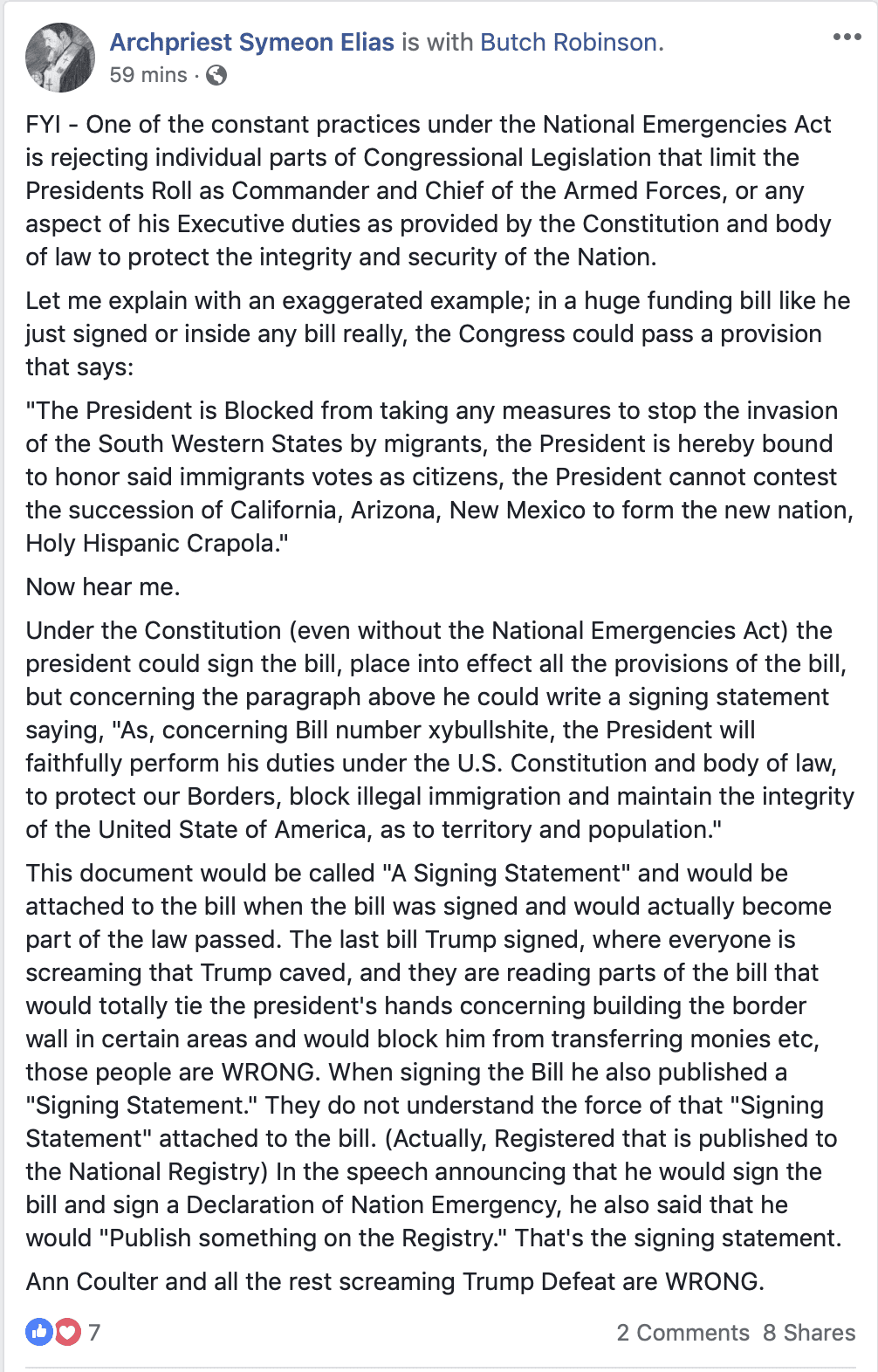Many people were dismayed that President Trump signed the funding bill this Friday, even though he also signed the Emergency Declaration before doing so.
They felt it contained too many hidden traps that would come back to bite him and tie his hands.
Ann Coulter has been one of the most vocal people who have turned against the President.
But I have to ask…..have you all learned nothing in the time we’ve been watching Trump?
Do you all think he suddenly lost a bunch of IQ points?
Do you think he suddenly lost his ability to negotiate a hard deal?
Do you think he suddenly got outplayed by someone like Nancy Pelosi?
COME ON FOLKS!
If the crowd is so fickle, it really scares me for our future.
President Trump scored a lot of big wins with what he did on Friday, most notably, getting another source of funding for the wall (don’t forget, he is getting wall funding from multiple different sources, including the emergency declaration, the amount in this budget is but a small piece).
But he also did something very cunning that almost no one is talking about.
Are you familiar with a “Signing Statement”?
Here’s a quick summary of what they are, from Georgetown Law:
When presidents sign bills into law, they sometimes issue written statements expressing their views on those bills. These written statements are known as “presidential signing statements.” Presidents often use signing statements to express their intention not to enforce parts of legislation that they consider to be unconstitutional, or otherwise provide an interpretation of the law as executive branch agencies will be directed to enforce it.
Since at least the Reagan era, scholars, jurists, and others have debated whether presidential signing statements should be considered as legislative history for purposes of interpreting federal statutes. In a recent example, U.S. Supreme Court Justice Antonin Scalia disagreed with his fellow justices’ disregard of a signing statement related to the Detainee Treatment Act, Pub. L. No. 109-148, §§ 1005-1006, 119 Stat. 2736 (2005). Hamdan v. Rumsfeld, 548 U.S. 557 (2006) (Scalia dissenting). In March 2009, President Obama issued a memo to the heads of executive departments and agencies in which he opined “In appropriately limited circumstances, [presidential signing statements] represent an exercise of the President’s constitutional obligation to take care that the laws be faithfully executed, and they promote a healthy dialogue between the executive branch and the Congress.”
Now, guess what?
When President Trump signed the “Consolidated Appropriations Act, 2019” this week, he included several Signing Statements!
Bet you didn't hear that on the Mainstream Media!
But it's true, you can read the entire Statement from Trump himself right here from WhiteHouse.gov.
Now here's why it's important.
I found this online and thought it was a great explanation.
Take a look:
FYI - One of the constant practices under the National Emergencies Act is rejecting individual parts of Congressional Legislation that limit the Presidents Roll as Commander and Chief of the Armed Forces, or any aspect of his Executive duties as provided by the Constitution and body of law to protect the integrity and security of the Nation.
Let me explain with an exaggerated example; in a huge funding bill like he just signed or inside any bill really, the Congress could pass a provision that says:
"The President is Blocked from taking any measures to stop the invasion of the South Western States by migrants, the President is hereby bound to honor said immigrants votes as citizens, the President cannot contest the succession of California, Arizona, New Mexico to form the new nation, Holy Hispanic Crapola."
Now hear me.
Under the Constitution (even without the National Emergencies Act) the president could sign the bill, place into effect all the provisions of the bill, but concerning the paragraph above he could write a signing statement saying, "As, concerning Bill number xybullshite, the President will faithfully perform his duties under the U.S. Constitution and body of law, to protect our Borders, block illegal immigration and maintain the integrity of the United State of America, as to territory and population."
This document would be called "A Signing Statement" and would be attached to the bill when the bill was signed and would actually become part of the law passed. The last bill Trump signed, where everyone is screaming that Trump caved, and they are reading parts of the bill that would totally tie the president's hands concerning building the border wall in certain areas and would block him from transferring monies etc, those people are WRONG. When signing the Bill he also published a "Signing Statement." They do not understand the force of that "Signing Statement" attached to the bill. (Actually, Registered that is published to the National Registry) In the speech announcing that he would sign the bill and sign a Declaration of Nation Emergency, he also said that he would "Publish something on the Registry." That's the signing statement.
Ann Coulter and all the rest screaming Trump Defeat are WRONG.
My friends.....take heart, our President ALWAYS does his homework and he didn't suddenly lose all his cunning!
For those of you who thought he got outplayed or just rolled over, SHAME ON YOU!
Also, you do know this funding bill expires in September right?
In other words, it's EXTREMELY temporary!
But when Trump starts and finishes construction on this big, beautiful wall, that will be very, very permanent!
Can you see the big picture?
Trump can.
So take a look at this.
This is the official Statement released by the Trump White House, explaining the Signing Statements he used when signing this new Bill into law:
Today, I have signed into law H.J. Res. 31, the “Consolidated Appropriations Act, 2019” (the “Act”), which authorizes appropriations to fund the operation of a number of agencies in the Federal Government through September 30, 2019.
Certain provisions of the Act (such as Division F, under the heading “Contribution for International Peacekeeping Activities”) would require advance notice to the Congress before the President may direct certain military actions or provide certain forms of military assistance. In signing the Act, I reiterate the well-established understanding of the executive branch that these types of provisions encompass only military actions for which providing advance notice is feasible and consistent with the President’s constitutional authority and duty as Commander in Chief to ensure national security. In addition, Division C, section 527, and Division A, section 516, both restrict the transfer of Guantanamo detainees to the United States. I will treat these, and similar provisions, consistent with the President’s constitutional authority as Commander in Chief.
Numerous provisions could, in certain circumstances, interfere with the exercise of the President’s constitutional authorities to negotiate international agreements (such as Division C, sections 509, 518, and 530; and Division F, sections 7010(c) and 7013(a)), to articulate the position of the United States in international fora (such as Division F, sections 7025(c), 7029(a), (b)(1), 7031(d)(2), 7042(h)(1), 7043(g)(1), 7047(b)(3), 7054(b), and 7060(c)(2)(D), (3)), to receive ambassadors (such as Division F, section 7031(c)), and to recognize foreign governments (such as Division F, section 7047(b)(2)(A)). My Administration will treat each of these provisions consistent with the President’s constitutional authorities with respect to foreign relations.
Division C, section 537, provides that the Department of Justice may not use any funds to prevent implementation of medical marijuana laws by various States and territories. I will treat this provision consistent with the President’s constitutional responsibility to faithfully execute the laws of the United States.
Certain provisions within Division D, title II, under the heading “Office of Management and Budget — Salaries and Expenses” impose restrictions on supervision by the Office of Management and Budget (OMB) of work performed by executive departments and agencies, including provisos that no funds made available to OMB “may be expended for the altering of the annual work plan developed by the Corps of Engineers for submission to the Committees on Appropriations”; that “none of the funds provided in this or prior Acts shall be used, directly or indirectly, by the Office of Management and Budget, for evaluating or determining if water resource project or study reports submitted by the Chief of Engineers acting through the Secretary of the Army are in compliance with all applicable laws, regulations, and requirements relevant to the Civil Works water resource planning process”; and that “none of the funds appropriated in this Act for the Office of Management and Budget may be used for the purpose of reviewing any agricultural marketing orders or any activities or regulations under the provisions of the Agricultural Marketing Agreement Act of 1937 (7 U.S.C. 601 et seq.).” The President has well-established authority to supervise and oversee the executive branch and to rely on subordinates, including aides within the Executive Office of the President, to assist in supervising the executive branch. Legislation that significantly impedes the President’s ability to supervise the executive branch or obtain the assistance of aides in this function violates the separation of powers by undermining the President’s ability to fulfill his constitutional responsibilities, including the responsibility to faithfully execute the laws of the United States. My Administration will, therefore, construe these restrictions in Division C, title II consistent with these Presidential duties.
Several provisions (such as Division F, section 7041(b)(3)) mandate or regulate the submission of certain executive branch information to the Congress. I will treat these provisions in a manner consistent with the President’s constitutional authority to withhold information that could impair foreign relations, national security, the deliberative processes of the executive branch, or the performance of the President’s constitutional duties. In particular, Division D, section 713, prohibits the use of appropriations to pay the salary of any Federal officer or employee who interferes with or prohibits certain official communications between Federal employees and Members of Congress or of any Federal officer or employee who takes adverse action against an officer or employee because of such communications. I will construe these provisions not to apply to circumstances that would detract from my authority to supervise, control, and correct communications by Federal officers and employees with the Congress related to their official duties, including in cases where such communications would be unlawful or could reveal confidential information protected by executive privilege.
Certain provisions (such as Division F, section 7064; and Division G, section 418) prohibit the use of funds to deny an Inspector General access to agency records or documents. I will construe these, and similar provisions, consistent with my authority to control the dissemination of information protected by executive privilege.
Certain provisions prohibit the use of funds to recommend certain legislation to the Congress (Division B, section 715), or require recommendations of certain legislation to the Congress (Division A, section 537). Because the Constitution gives the President the authority to recommend “such Measures as he shall judge necessary and expedient”, my Administration will continue the practice of treating provisions like these as advisory and non-binding.
Numerous provisions purport, in certain circumstances, to condition the authority of officers to spend or reallocate funds on the approval of congressional committees (Division B, sections 702, 706, and 716(a), (b); Division E, sections 403 and 409; Division G, sections 188, 405, and 406). These are impermissible forms of congressional aggrandizement in the execution of the laws other than by the enactment of statutes. My Administration will make appropriate efforts to notify the relevant committees before taking the specified actions and will accord the recommendations of such committees all appropriate and serious consideration, but it will not treat spending decisions as dependent on the approval of congressional committees.
That sounds to me like a whole lot of wiggle room, and signaling that he doesn't intend to be bound by any of these "traps" in the Bill.
So to anyone who thinks President Trump just rolled over, I'm sorry but you clearly have not been paying attention for the last 4 years.
With no political experience, this man defeated 17 seasoned Republican challengers, the Clinton Machine, the Mainstream Media and the Deep State....do you think he was really going to suddenly trip up over something like this?
Check yourself.





Join the conversation!
Please share your thoughts about this article below. We value your opinions, and would love to see you add to the discussion!